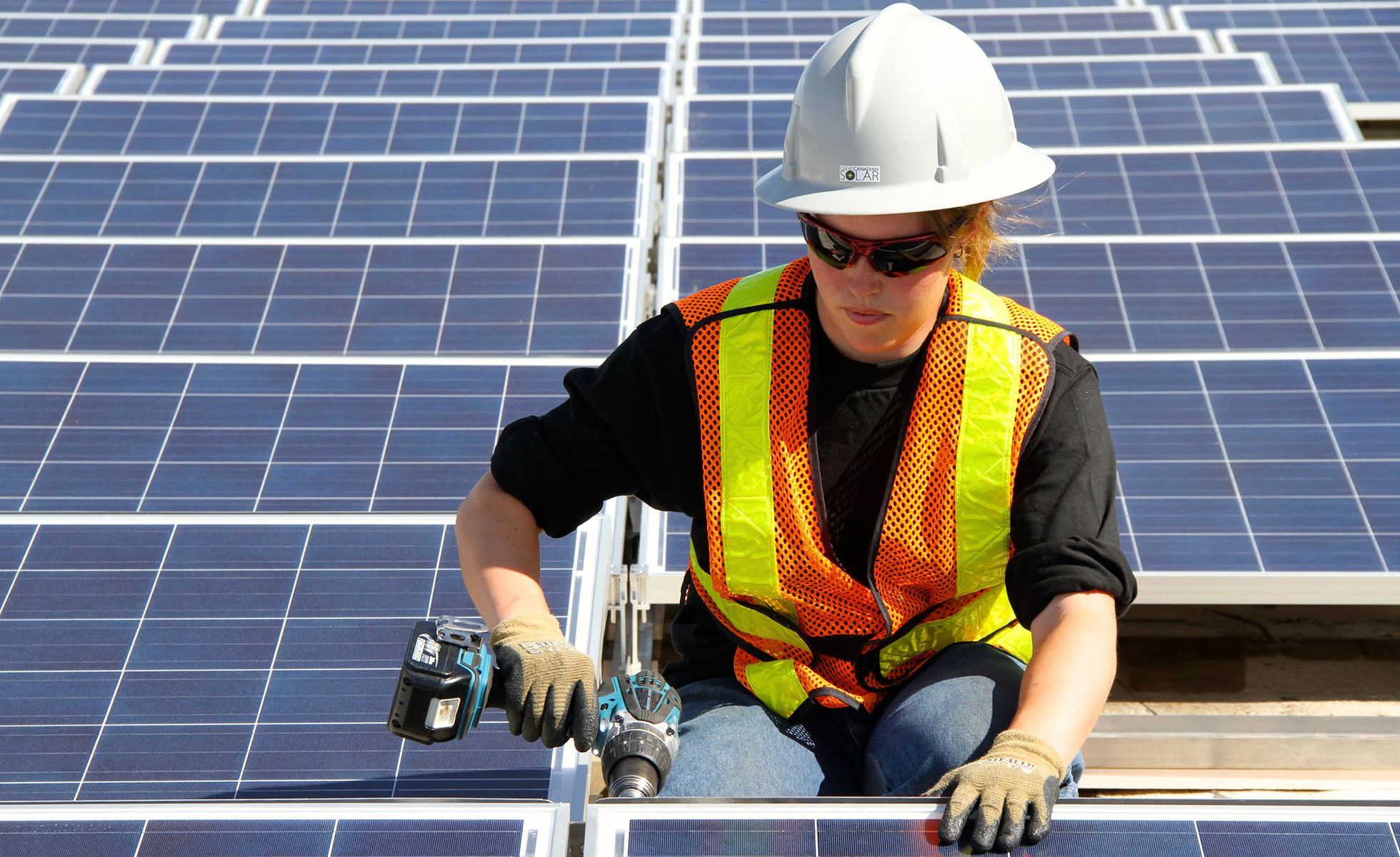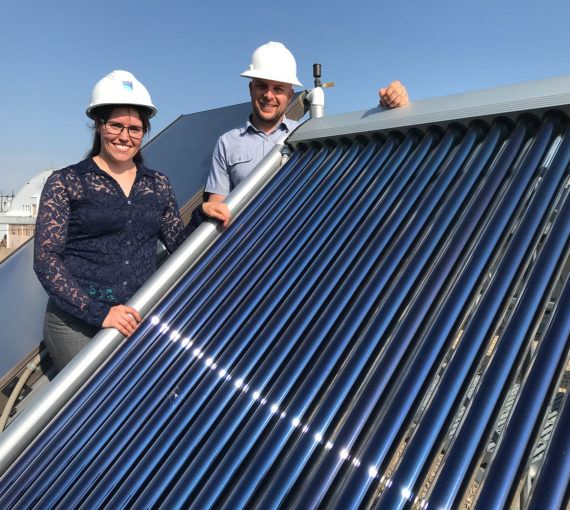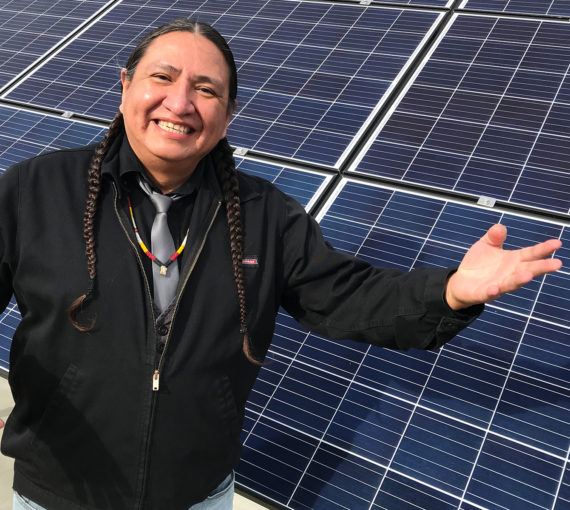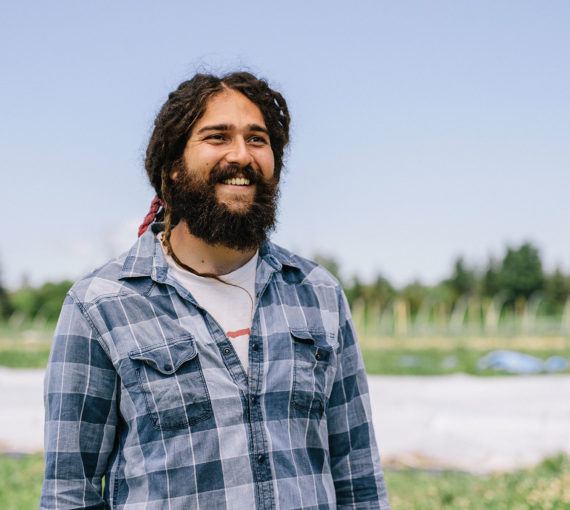
A “just transition” involves switching to low carbon economy in a way that benefits everyone, including workers in the energy sector. (Photo: Green Energy Futures via Flickr)
As Canadians, we know we need to do our fair share to reduce carbon pollution and lower the risk of catastrophic climate change. But what will that mean for the thousands of people employed in our coal, oil and gas industries?
Blue Green Canada is working to ensure the transition to renewable energy happens without leaving anyone behind. Its program manager Jamie Kirkpatrick calls this “a substantial issue, because you’re talking about a way of life ending.”
Blue Green Canada unites labour unions with environmental and civil society groups around environmental issues. It hosts workshops and runs campaigns to help workers find a secure place in the new energy economy.
The idea at the heart of Blue Green Canada’s mission is a “just transition,” which involves switching to low carbon economy in a way that benefits everyone, including workers in the energy sector. As Kirkpatrick says, “It’s not fair that people who have provided the fuel and energy to run our economy for the last hundred or so years are just run over by a green wave. They need to be transitioned and there needs to be plans to support the communities that depend on those industries.”
It’s not fair that people who have provided the fuel and energy to run our economy for the last hundred or so years are just run over by a green wave. They need to be transitioned and there needs to be plans to support the communities that depend on those industries.
Jamie Kirkpatrick, Blue Green Canada

Jamie Kirkpatrick, program manager at Blue Green Canada.
Founded in 2008 by the United Steelworkers and Environmental Defence, Blue Green Canada has grown to include Unifor, Clean Energy Canada, the Columbia Institute, the Broadbent Institute and the Pembina Institute. Blue Green Canada facilitates conversations among its members and other organizations’ common interests in helping workers transition smoothly and fairly to a low-carbon future.
Embracing the “just transition” philosophy was pivotal to Kirkpatrick’s own understanding of climate solutions. He says that considering a wider audience — including, for example, workers in the energy sector alongside environmentalists — can lead to different conversations about solutions. “Instead of running campaigns that just focus on shutting down that coal plant, let’s work together to make sure it’s done right, and maybe we could have it become some other kind of energy plant,” he says.
One of Blue Green Canada’s projects involves pushing for tighter emissions regulations on methane, a greenhouse gas with 84 times the potency of carbon dioxide over a 20-year period. “When you have methane regulations imposed on industry…folks have to go out and detect the leaks and the venting and address them,” Kirkpatrick says. “It’s a win-win: creating good jobs and addressing a major source of climate damage.”
While industrial energy production and methane regulations are an important part of Blue Green Canada’s work, Kirkpatrick says what makes the organization’s approach unique is its focus on the human side of these issues. “When you look from afar you might think, what a great plan the government has put together; it takes care of people by giving extended employment insurance at a good rate, or something like that. But it doesn’t deal with the emotion of getting told that your job’s going to disappear.”
Blue Green Canada promotes, discusses and advocates for policy and plans that ensure a just transition for workers and impacted communities, leaving no one behind.
Kirkpatrick was excited to see the just transition as a major focus of discussion at the 2018 international climate conference, COP 24, in Katowice, Poland, where the just transition declaration that many countries signed was developed. He hopes that as the idea continues to gain traction, it will help us all rise above disagreements about climate action to move forward together.
Renewable energy is empowering communities across the country. Charged Up is the story of you — of all of us — on a mission for a cleaner, healthier charged-up Canada.

Lila Asher
David Suzuki Foundation volunteer Lila Asher is a writer, researcher, activist and figure skater. She is a recent graduate of the University of Toronto with a BA in Equity Studies and Environmental Biology.


